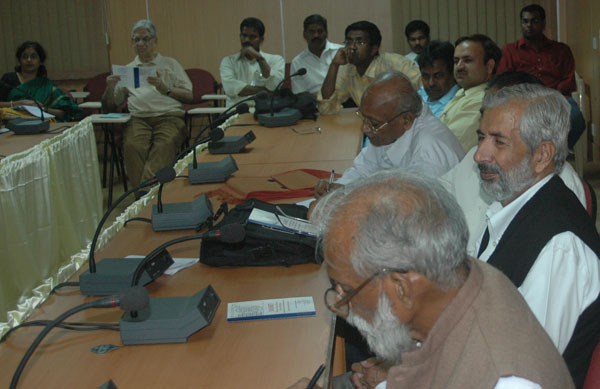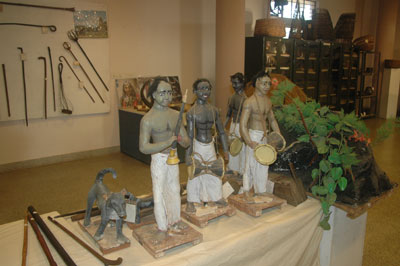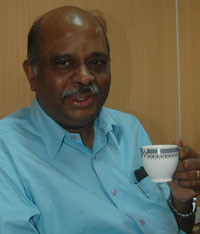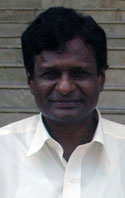SWEDISH SOUTH ASIAN STUDIES NETWORK
Visit to the Anthropological Survey of India ASI), Mysore,
Wednesday,
November 28, 2007
Web page: http://www.anthsi.gov.in
 The Anthropological Survey of India (ASI) has a long-standing reputation as being an important national institution. It was established by the Government of India at the end of the colonial period in 1945. It aim was from the beginning to collect “scientific information about the people of India for the use of researchers, planner, and administrators”. Its head office was – and still is – in Kolkata, but ASI has also several regional headquarters and offices spread all over India. The one in Mysore is called the Southern Regional Office and was founded in 1960.
The Anthropological Survey of India (ASI) has a long-standing reputation as being an important national institution. It was established by the Government of India at the end of the colonial period in 1945. It aim was from the beginning to collect “scientific information about the people of India for the use of researchers, planner, and administrators”. Its head office was – and still is – in Kolkata, but ASI has also several regional headquarters and offices spread all over India. The one in Mysore is called the Southern Regional Office and was founded in 1960.
ASI’s aim is to study all the communities in India from a biological and cultural point of view, to preserve and examine human skeletal remains, to collect and conserve representative examples of indigenous arts and other heritages, to train advanced students, and to publish and disseminate results through its The Journal of Anthropological Survey in India, by issuing research reports, videos, and DVS, holding exhibitions, and maintaining eight ethnographic museums in India. In recent years, ASI has developed high-tech DNA research laboratories, digital cartography, visual anthropology, and ancient bio-molecular laboratories.
 We visited the ASI research institute in Mysore mainly due to its long-term collaboration with Dr. Christer Norström at the Department of Anthropology, University of Stockholm. In 2003, Christer Norström organised a research conference titled “Sustainable Livelihood of Tribes”, funded by a SASNET at ASI in Mysore. The conference was organized in collaboration
with the Centre for Research on Environment,
Development, Innovations, Technology & Trade, CREDITTe, in Bangalore. Go to the conference page, where the papers presented are available
for download.
We visited the ASI research institute in Mysore mainly due to its long-term collaboration with Dr. Christer Norström at the Department of Anthropology, University of Stockholm. In 2003, Christer Norström organised a research conference titled “Sustainable Livelihood of Tribes”, funded by a SASNET at ASI in Mysore. The conference was organized in collaboration
with the Centre for Research on Environment,
Development, Innovations, Technology & Trade, CREDITTe, in Bangalore. Go to the conference page, where the papers presented are available
for download.
We were fortunate to be present at ASI when two events were going on: “National Conference on Medical Anthropology and Health Sciences” and “National Seminar on Policies and Issues in the Bio-cultural Development of Scheduled Tribes”, giving us the opportunity of meeting several of India’s leading anthropologists and telling them about SASNET. After the first conference ended, in the evning Anna was also given the opportunity to give a lecture on her research in Kerala, based on her 2001 PhD thesis ”Experience
and Identity: A Historical Account of Class, Caste, and Gender among
the Cashew Workers of Kerala, 1930-2000” (more information).
Because of the conferences, in which many anthropologists from all over India participated – Lars was happy to meet Prof. T.B. Subba from the North East Hill University (NEHU) in Shillong, that Lars and Staffan met during their previous contact journey to the Northeast (read SASNET report from NEHU).
 An even more prominent visitor to the conferences was Dr. V.R. Rao (photo to the left), Director-in-Charge for the Anthropological Survey of India Head Office in Kolkata. Thereby giving us a great opportunity to have a discussion with him on possibilities for increased Indo-Swedish collaboration in the field of anthropology, and present SASNET to him.
An even more prominent visitor to the conferences was Dr. V.R. Rao (photo to the left), Director-in-Charge for the Anthropological Survey of India Head Office in Kolkata. Thereby giving us a great opportunity to have a discussion with him on possibilities for increased Indo-Swedish collaboration in the field of anthropology, and present SASNET to him.
 Dr. Suresh Patil (photo to the right), Head of Office, ASI Mysore, is responsible for the International School of Anthropology (ISA), that aims to train through a battery of short and long-term courses, at all levels, with a design that meets the specific requirements of the trainees. Training would be imparted by a team of national and international faculty, who are known authorities in their respective spheres of knowledge activity. It is also being envisaged that that the international faculty, who is willing to stay for a minimum period of two months with the Centre would teach as well as enter in to a collaborative research activity with the ASI's researchers. More information about ISA.
Dr. Suresh Patil (photo to the right), Head of Office, ASI Mysore, is responsible for the International School of Anthropology (ISA), that aims to train through a battery of short and long-term courses, at all levels, with a design that meets the specific requirements of the trainees. Training would be imparted by a team of national and international faculty, who are known authorities in their respective spheres of knowledge activity. It is also being envisaged that that the international faculty, who is willing to stay for a minimum period of two months with the Centre would teach as well as enter in to a collaborative research activity with the ASI's researchers. More information about ISA.
Dr. Patil organised a meeting for us with his colleagues in the afternoon, and afterwards with the conference participants. We could inform about SASNET, and a great interest was shown among the participants. Generally, they expressed the desire for more collaboration with foreign universities (including Sweden), and particularly in various cultural exchange programmes for Ph.D. students and faculty members. Today ASI has some exchange programmes with Germany and France sponsored by the International School of Anthropology (ISA).
Other anthropologists we met (besides those already mentioned):
Prof. P.K. Misra,
President, Anthropological Association, Mysore
Prof. S.N. Ratha,
Dean, Mahatma Gandhi National Institute of Research and Social Action, Hyderabad
Dr. T.N. Pandit, former Director, Anthropological Survey of India,
New Delhi
Prof. H.K. Bhat,
Dept. of Anthropology,
University of Mysore
Dr. Ravinder Singh,
Asst. Professor in Medical Anthropology,
Institute of Human Behaviour and Allied Sciences (IHBAS), Delhi
Dr. P.R.G. Mathur,
Director, L.K. Anantha Krishna Iyer Center for Research,
Palakkad, Kerala
Dr. V. Jayarajan,
Chairman, Folkland, International Centre for Folklore and Culture,
Elambachi, Kasargod Dist., Kerala
Prof. R.K. Kar,
Dept. of Anthropology, Diburgarh University, Assam
Mr. Debi Prasad Halder, Senior Research Fellow,
Anthropological Survey of India, Shillong
Prof. T. Ramachandraiah,
former Professor, Dept. of Anthropology, University of Mysore
Dr. S.B. Konale,
ASI Mysore
Mr. S.Y Saheb,
ASI Mysore
Mr. Ramji Gupta,
ASI Mysore
Dr. S.A.A. Saheb, ASI Mysore
Dr. H.M.M. Patel, ASI Mysore
Dr. B.R. Vijayendra, ASI Mysore
Dr. M. Rajendra Prasad, ASI Mysore
Dr. Satish Kumar, ASI Mysore
Mr. R. Rajendra Prasad, ASI Mysore
Dr. A. Chandrasekar, ASI Mysore
Dr. M. B. Sharma, ASI Mysore
Dr. D. Xaviour, ASI Mysore
Mr. C. Raghu, ASI Mysore
SASNET - Swedish South Asian Studies Network/Lund
University
Address: Scheelevägen 15 D, SE-223 70 Lund, Sweden
Phone: +46 46 222 73 40
Webmaster: Lars Eklund
Last updated
2008-05-22
